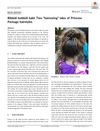 1 citations,
August 2004 in “Alternative & complementary therapies”
1 citations,
August 2004 in “Alternative & complementary therapies” Non-drug methods like diet, supplements, and aromatherapy can help manage hair loss and its emotional impact.
 December 2024 in “Asian Journal of Pharmaceutical and Clinical Research”
December 2024 in “Asian Journal of Pharmaceutical and Clinical Research” Combining synthetic and herbal treatments may help with hair loss, but more research is needed.
 January 2024 in “Deleted Journal”
January 2024 in “Deleted Journal” Essential oils may help hair health but lack strong scientific proof and can cause allergic reactions.
[object Object]  January 2015 in “Springer eBooks”
January 2015 in “Springer eBooks” Some alternative treatments may help with hair loss, but more evidence is needed to confirm their effectiveness.

No treatment alters the natural progression of alopecia areata, and effectiveness varies, with some possibly working better in children.
 March 2012 in “Daehan hwajangpum hakoeji/Daehan hwa'jangpum haghoeji”
March 2012 in “Daehan hwajangpum hakoeji/Daehan hwa'jangpum haghoeji” The cream with plant components increased skin collagen and the hair tonic promoted hair growth in mice.
 January 2012 in “Methods in pharmacology and toxicology”
January 2012 in “Methods in pharmacology and toxicology” TRPV3 could be a target for treating pain, skin disorders, and hair problems, but more research is needed to create effective drugs.
 January 2017 in “Cogent Medicine”
January 2017 in “Cogent Medicine” Extracts improve hair growth in alopecia.
 3 citations,
August 2020 in “PubMed”
3 citations,
August 2020 in “PubMed” Some natural ingredients like onion juice, rosemary oil, and pumpkin seed oil may help with hair growth and reducing hair loss.
Rosemary oil effectively promotes hair growth in mice.
77 citations,
September 2017 in “Journal of Investigative Dermatology” TRPV3 in skin cells causes inflammation and cell death.
35 citations,
November 2021 in “Journal of nanobiotechnology” Thymol-loaded nanoparticles are a promising, natural treatment for acne that avoids antibiotics and preserves healthy skin bacteria.
23 citations,
February 2021 in “Dermatologic therapy” Some treatments like pentoxifylline with topical corticosteroids might work for alopecia areata, but more research is needed to find the best one.
11 citations,
August 2021 in “The journal of investigative dermatology/Journal of investigative dermatology” A gene mutation causes early keratinocyte maturation leading to hair loss in Olmsted syndrome.
9 citations,
June 2023 in “Cells” Certain natural and synthetic compounds may help treat inflammatory skin diseases by targeting a specific signaling pathway.
7 citations,
May 2015 in “Journal of biological chemistry/The Journal of biological chemistry” Different ligands change the shape of the TRPV3 ion channel in unique ways.
5 citations,
January 2014 in “Advances in bioscience and biotechnology” Natural honey protects against Doxorubicin's harmful effects.
2 citations,
February 2024 in “Pharmaceutics” Chitosan scaffolds with silver nanoparticles effectively treat infected wounds and promote faster healing.
 2 citations,
May 2023 in “International Journal of Molecular Sciences”
2 citations,
May 2023 in “International Journal of Molecular Sciences” The TRPV3 ion channel is important for skin and hair health and could be a target for treating skin conditions.
 1 citations,
May 2022 in “Scientific African”
1 citations,
May 2022 in “Scientific African” Oleogels made from Cedarwood and Rosemary oils can enhance hair growth, but combining both oils doesn't increase the effect.
 December 2024 in “Frontiers in Genetics”
December 2024 in “Frontiers in Genetics” EGFR and mTOR inhibitors may help manage Olmsted syndrome symptoms.
 November 2024 in “International Journal of Molecular Sciences”
November 2024 in “International Journal of Molecular Sciences” Nanoparticles may improve caffeine delivery for hair growth, offering a potential alternative to minoxidil for hair loss treatment.
 April 2024 in “Chemical engineering journal”
April 2024 in “Chemical engineering journal” The new hydrogel made from thymol and glycyrrhizin helps heal MRSA-infected wounds in rats effectively.
 January 2024 in “Future postharvest and food”
January 2024 in “Future postharvest and food” Frankincense may help treat COVID-19, but more research is needed.
May 2020 in “Authorea (Authorea)” Olfactory receptors found outside the nose may offer new treatments for diseases like cancer and help in wound healing and hair growth.
[object Object]  2 citations,
April 2018 in “Pediatric dermatology”
2 citations,
April 2018 in “Pediatric dermatology” Elaborate princess hairstyles at a theme park caused hair loss and scalp damage in young girls.
May 2022 in “The journal of immunology/The Journal of immunology” FOXN1 is crucial for thymus development and immune response in Xenopus laevis.
July 2014 in “Journal of the Dermatology Nurses' Association” The document concluded with a call for article submissions for the 2014 Writing Awards.
 24 citations,
March 2018 in “Experimental Dermatology”
24 citations,
March 2018 in “Experimental Dermatology” Treg dysfunction is linked to various autoimmune skin diseases, and understanding Treg properties is key for new treatments.
 March 2024 in “Frontiers in reproductive health”
March 2024 in “Frontiers in reproductive health” Women of color in Northern Manhattan view hair care as important to their identity and culture, and education on harmful chemicals in hair products is needed.


















